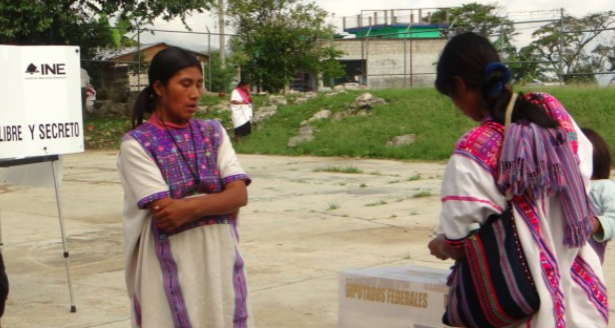by Francisco López Bárcenas

Photo: Network of Electoral Observers
The current electoral process will pass into the history of the elections of Mexico as the first to allow indigenous participation in the selection of deputies and governors. It will also be remembered as the one to accumulate the most fraud against the exercise of the rights of indigenous peoples, committed by the National Electoral Institute (INE), the agency responsible for organizing the elections, the political parties and the people belonging to the indigenous communities. It is not that the indigenous people had not previously participated as candidates to posts of popular election. The Institutional Revolutionary Party (PRI) is remember for running indigenous chiefs as deputies or senators; during a time the Party of Democratic Revolution (PRD) reserved some deputy and senate seats for members of some indigenous organization, and in the National Action Party (PAN) it became a sport to offer deputyships and senatorships to some indigenous people, as a way to prove themselves to be politically correct.
But there is a difference between those candidacies and these. The former were an offering that the parties made to some indigenous leaders, these on the other hand, are candidacies that the political parties are obliged by the INE to reserve for indigenous people, a dispensation that has been endorsed by the Electoral Tribunal of the Judiciary of the Federation with some subtleties. It’s just that the reservation of indigenous candidacies in the parties is not a manner of exercising the political rights of the indigenous peoples; on the contrary, it represents a way of submitting that autonomous right to state spaces, a game in which, be it in an innocent or cynical way, some indigenous people have participated, legitimizing the violation of the political rights of these peoples with the argument of promoting its practice.
In effect, the Political Constitution of the United Mexican States expresses that, as part of their autonomy, the indigenous peoples have the right to enter into popularly-elected public offices in accordance with their traditional norms, proceedings and practices and the United Nations Declaration on Indigenous Peoples provides that the indigenous peoples have the right to maintain and strengthen their own political, judicial, economic, social and cultural institutions, while maintaining their right to participate fully, if they so desire, in the political, economic, social and cultural life of the State. In these norms, which are of obligatory observance for the Mexican State, it is clear that it is the peoples’ right and should be exercised via their own mechanisms, which includes the manner of choosing the proceedings to do so. Imposing another form of doing it, as the INE has done, is a violation of indigenous rights.
But the matter does not remain there. The political parties have used this resolution to, with the most racist and discriminatory criterion, instead of reserving those spaces for candidates that the indigenous people or communities might propose, nominate non-indigenous people who were left without spaces, but who wanted to enter into legislative office. To achieve this, it was easy to go to an indigenous community to obtain accreditation as members of the community, and in the case that this wasn’t possible, they falsified it. They didn’t count on having indigenous people interested in these candidacies, and they were the ones who protested against the mess, thereby unmasking the partisan tricks, but also their own, since they argued that they were eligible to be candidates without this being true, because as has been said, the right to nominate candidates is the right of the indigenous peoples and communities, not to the (other) people that belong to them.
All of these frauds not only threaten the right of the indigenous peoples and communities to be the ones to nominate candidates that represent them in the integration of national powers; they also denature the meaning of political participation for indigenous people and the significance of these. In the case of the political offices, for example, while outside of the indigenous world it is considered an individual right, and in addition whoever enters into it receives a high salary, in the indigenous world, it is treated as a free service, a sacrifice that one has to do to maintain the harmony of the town or community. That is the point of the participation of the indigenous peoples and communities in the integration of government bodies; not that indigenous people be nominated by some political party, much less that they be used to satisfy the petty interests of their kin.
But for that to come about, many changes are needed. The primary one will be overcoming the racism and discrimination against indigenous people, and for them to organize themselves in order to not be supplanted by political traffickers.
This piece was published in La Jornada on April 23rd, 2021. https://www.jornada.com.mx/2021/04/23/opinion/015a2pol This English interpretation has been republished by Schools for Chiapas.
